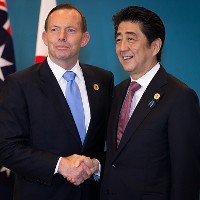

Australian consumers will have access to cheaper Japanese cars, electronics and white goods starting today, with the Australia-Japan Free Trade Agreement now underway.
The Japan-Australia Economic Partnership Agreement was secured by the federal government in April 2014 and officially signed by Prime Minister Tony Abbott and Japanese Prime Minister Shinzo Abe in July.
The Australian agricultural sector is set to be one of the biggest winners from the deal, with tariffs on Australian beef, wine and shellfish among those to be substantially reduced. Aussie miners will also benefit from the deal, with tariffs to be cut on some coal, oil and mineral products, as well as Australian financial and legal services providers, who will be granted greater access to Japanese markets.
But on the other side of the table, the 5% tariff on imported Japanese cars, electronics and white goods will be phased out over a period of eight years. Car makers Toyota, Ford and Holden have already announced a price drop on family cars in anticipation of the deal and Australian electronics and appliance retailers are expecting their industries to follow suit.
Peter Harris, chief operating officer at Appliances Online, told SmartCompany the retailer will be passing on any savings from the trade deal to its customers.
“Our space is based on very tight margins, so any reduction will have a good benefit,” Harris says.
Harris believes the reduction in the tariffs on Japanese electronics and white goods will help the likes of Sony, Panasonic and Sharp, which he says have been overshadowed by Korean appliance brands in recent times.
“It will put the spotlight back on Japanese products and those brands will be top of mind at the moment, which will hopefully lead to better deals for consumers.”
But Harris says any free trade agreement with China will potentially have an even bigger impact on the Australian electronic and appliances retail market
“Chinese manufacturers are still a sleeping giant in a way,” he says. “It could be a game changer again.”
Harris says it is unlikely that consumers will seek to bypass local retailers to access cheaper electronics and appliances as a result of free trade deals, as consumers still prefer to deal with local retailers when it comes to purchases items such as TVs and large domestic appliances.
“The fact that it is such a competitive space and there is not a lot of margin around, I don’t think we will see any grey importing or parallel importing,” he says.
Speaking generally about the value of free trade, JB Hi-Fi chief executive Richard Murray told SmartCompany “anything that helps lower costs for consumers is a great outcome”.
“JB Hi-Fi is all about giving consumers the best value, and assuming the tariff reductions are passed on by suppliers, consumers will benefit,” Murray says.
Small Business Minister Bruce Billson said in a statement that Australian small businesses will benefit from the agreement.
He said the elimination of tariffs on imports from Japan was a “good news story” for Australian SMEs.
“Lower tariffs mean a cheaper imported business input which, in turn, means more support for competitiveness and for increased profitability for small businesses.”


COMMENTS
SmartCompany is committed to hosting lively discussions. Help us keep the conversation useful, interesting and welcoming. We aim to publish comments quickly in the interest of promoting robust conversation, but we’re a small team and we deploy filters to protect against legal risk. Occasionally your comment may be held up while it is being reviewed, but we’re working as fast as we can to keep the conversation rolling.
The SmartCompany comment section is members-only content. Please subscribe to leave a comment.
The SmartCompany comment section is members-only content. Please login to leave a comment.